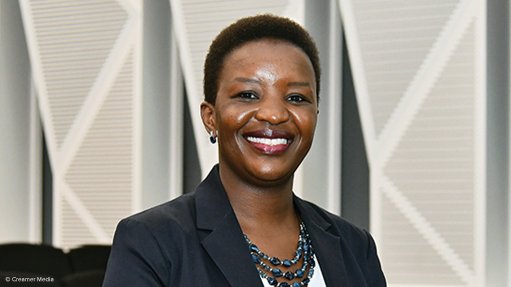
BLSA CEO Busi Mavuso
Photo by: Donna Slater
Until a year ago, our diplomatic relations with the world were not particularly relevant to the business environment. But that changed dramatically when the Lady R, a sanctioned Russian ship, docked in Simon’s Town, having turned off its transponders before doing so. The news caused the rand to fall and has increased the cost of doing business.
I can understand why those allied with Ukraine in the war with Russia were alarmed. The circumstances of the docking were highly suspicious, and the lack of immediate explanation from the SA National Defence Force compounded the uncertainty. Nato-aligned countries are major buyers of both our manufactured goods and raw materials, as well as suppliers of significant amounts of investment. Since the incident, South Africa has been questionable as a counterpart to Western trading partners, yet another risk that must be priced in when considering investment in our country. The incident also increased risks that our trade access to the United States would be curtailed when that country reviews eligibility in terms of its African Growth and Opportunity Act.
When President Cyril Ramaphosa announced a panel led by a retired judge to investigate, we called for its work to be done quickly, to limit the damage. The inquiry had the potential to help correct the risk premium we are now subject to. To do that it would need to be thorough and credible and resolve fears that South Africa was involved in the Russia/Ukraine conflict.
Last week we saw the release of only an executive summary of the report, on the grounds that the full report contained sensitive and classified information that would threaten the country’s security. The summary, unfortunately, does not provide a definitive account of what happened. It gives limited information regarding the goods that were delivered. For example, it does not cite which licences under the National Conventional Arms Control Committee covered the imports.
There is some suggestion that the docking of the ship in Simon’s Town conflicted with SA Revenue Service port of entry rules, but the report does little else to suggest wrongdoing. Confusingly, the fact that the ship was offloaded at night is explained as necessary given the classified nature of the goods. Yet the report also said the original plan was to offload the ship at Ngqura or Port Elizabeth, which are normal commercial ports where presumably such protocols couldn’t apply. The ship apparently ended up at Simon’s Town only because Ngqura/Port Elizabeth refused it, given its sanctioned status.
Despite the many such questions the report raises, it is definitive that nothing was loaded onto the ship for export. That was the most damaging allegation that had been made, with US Ambassador Reuben Brigety having publicly said he was confident arms were loaded. The authors of the Lady R report are respected jurists and lawyers, though the details released are not enough on their own merit to warrant a definitive conclusion. The geopolitical concerns around Lady R have not been eliminated and so business must continue to manage the risks.
Raymond Ackerman was a giant of the South African business community. Our retail industry is world class in no small part due to the fiery, competitive approach that Ackerman took to building Pick n Pay and his focus on delivering to customers. He was a committed South African, choosing to stay and build South Africa when many others were leaving.His clashes with the apartheid government were legendary. They were known both for their efforts to stop competition through state monopolies and marketing control boards. His efforts materially reduced costs for consumers. In the democratic era he became an elder in business, pushing for better governance and a more competitive economy. He will be missed, and my condolences to his family and friends.
Mangosuthu Buthelezi was another giant, this time of the political arena. He played a key part in fostering a climate of reconciliation, stability and growth in the post-Apartheid era, a period of strong growth for our economy. He served in cabinet under both Mandela and Mbeki and acted as president several times. He understood the importance of economic prosperity as a foundation for social cohesion and worked hard to bridge the gap between the private and public sectors. He wanted everyone to have a shot at economic success and supported our market economy. My condolences to the Royal Household and the Zulu Nation.
Issued by BLSA